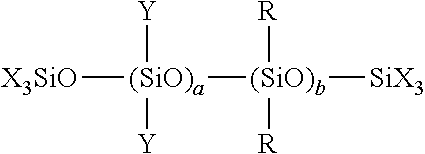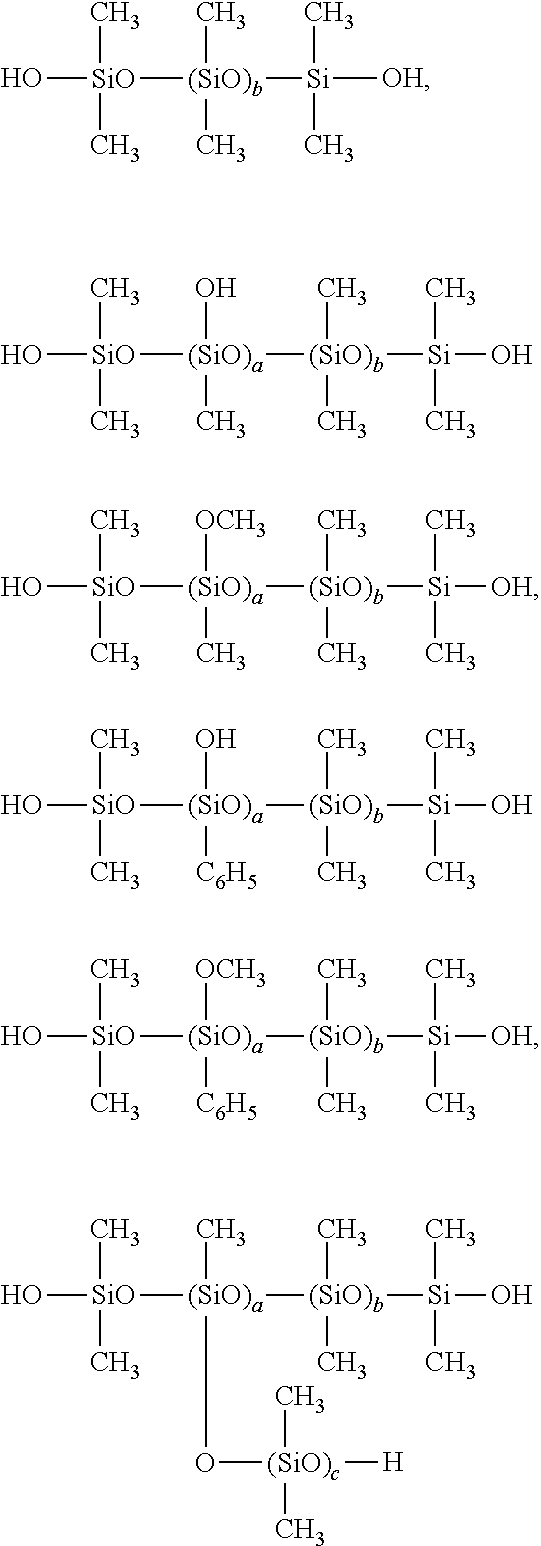Wood treatment and treated wood
a wood treatment and wood technology, applied in the field of wood treatment, can solve the problems of ineffective methods, inability to meet outdoor use long-term, and boron compounds readily leached out of wood, so as to prevent boron compounds, improve the appearance and quality of wood, and prevent boron compounds. the effect of affecting the quality of wood
- Summary
- Abstract
- Description
- Claims
- Application Information
AI Technical Summary
Benefits of technology
Problems solved by technology
Method used
Image
Examples
preparation example 1
[0071]A 2-L polyethylene beaker was charged with 498 g of octamethylcyclotetrasiloxane, 2 g of triethoxyphenylsilane, 50 g of 10% sodium laurylsulfate aqueous solution and 50 g of 10% dodecylbenzenesulfonate aqueous solution, which were homogeneously emulsified using a homomixer. Water, 400 g, was slowly added for dilution, and the diluted liquid passed twice through a high-pressure homogenizer under a pressure of 300 kgf / cm2, yielding a homogeneous white emulsion. This emulsion was transferred to a 2-L glass flask equipped with a stirrer, thermometer and reflux condenser, where it was subjected to polymerization reaction at 50° C. for 24 hours and aged at 10° C. for 24 hours. This was followed by neutralization to pH 6.2 with 12 g of 10% sodium carbonate aqueous solution. The emulsion thus obtained had a nonvolatile content of 45.4% upon drying at 105° C. for 3 hours, and contained a non-flowing, soft gel-like organopolysiloxane having an average composition represented by [(CH3)2S...
preparation example 2
[0072]A 2-L polyethylene beaker was charged with 500 g of octamethylcyclotetrasiloxane, 50 g of 10% sodium laurylsulfate aqueous solution and 50 g of 10% dodecylbenzenesulfonate aqueous solution, which were homogeneously emulsified using a homomixer. Water, 400 g, was slowly added for dilution, and the diluted liquid passed twice through a high-pressure homogenizer under a pressure of 300 kgf / cm2, yielding a homogeneous white emulsion. This emulsion was transferred to a 2-L glass flask equipped with a stirrer, thermometer and reflux condenser, where it was subjected to polymerization reaction at 50° C. for 24 hours, and aging at 10° C. for 24 hours. This was followed by neutralization to pH 6.2 with 12 g of 10% sodium carbonate aqueous solution. The emulsion thus obtained had a nonvolatile content of 45.5% upon drying at 105° C. for 3 hours, and contained a gum-like organopolysiloxane of the formula HO—[(CH3)2SiO]n—H having a viscosity of at least 1,000 Pa·s. In this way, an emulsio...
preparation example 3
[0073]Maleic anhydride, 154 g, was dissolved in 500 g of ethanol, after which 346 g of 3-aminopropyltriethoxysilane was added dropwise at room temperature over one hour. Reaction was performed under ethanol reflux at 80° C. for 24 hours, yielding a pale yellow clear solution [B-1] containing 50% of component (B). This solution had a nonvolatile content of 45.1% upon drying at 105° C. for 3 hours. The reaction product in the solution consisted of about 60% of a mixture of (C2H5O)3SiC3H6—NHCO—CH═CHCOOH and (C2H5O)3SiC3H6—NH3+−OCOCH═CHCOOC2H5 and the remainder (about 40%) of oligomers derived therefrom, as analyzed by IR, GC, NMR and GCMS.
PUM
| Property | Measurement | Unit |
|---|---|---|
| weight | aaaaa | aaaaa |
| stability | aaaaa | aaaaa |
| water solubility | aaaaa | aaaaa |
Abstract
Description
Claims
Application Information
 Login to View More
Login to View More - R&D
- Intellectual Property
- Life Sciences
- Materials
- Tech Scout
- Unparalleled Data Quality
- Higher Quality Content
- 60% Fewer Hallucinations
Browse by: Latest US Patents, China's latest patents, Technical Efficacy Thesaurus, Application Domain, Technology Topic, Popular Technical Reports.
© 2025 PatSnap. All rights reserved.Legal|Privacy policy|Modern Slavery Act Transparency Statement|Sitemap|About US| Contact US: help@patsnap.com


